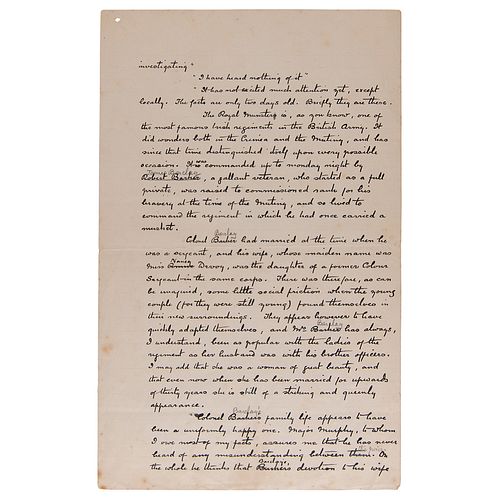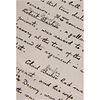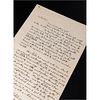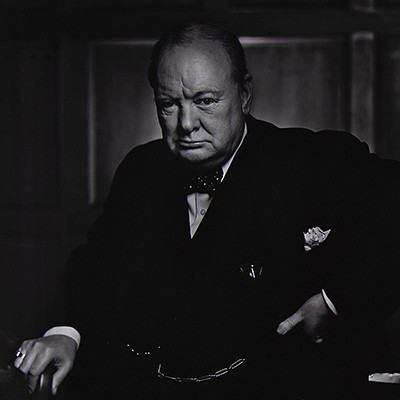Arthur Conan Doyle Handwritten Manuscript Page from the Sherlock Holmes Story 'The Crooked Man'
Two ways to bid:
- Leave a max absentee bid and the platform will bid on your behalf up to your maximum bid during the live auction.
- Bid live during the auction and your bids will be submitted real-time to the auctioneer.
Bid Increments
| Price | Bid Increment |
|---|---|
| $0 | $5 |
| $50 | $10 |
| $200 | $25 |
| $500 | $50 |
About Auction
Feb 22, 2024
RR Auction's first-ever February installment of its Remarkable Rarities series brings some 50+ pieces of history to the auction block, representing the most elusive and extraordinary items offered all year. RR Auction support@rrauction.com
- Lot Description
Autograph manuscript leaf from Arthur Conan Doyle's draft for the Sherlock Holmes story 'The Crooked Man,' one page, 8 x 12.75, no date but circa 1893. One of the first 'Locked Room' mystery stories ever written, Holmes himself calls the The Crooked Man 'one of the strangest cases which ever perplexed a man’s brain.' The story employs a different, and more interiorized, literary technique than most Sherlock Holmes adventures—the narrative of the adventure is largely taken up with Holmes openly ruminating on the known facts of the case (seeking to deduce the missing key to the crime)—and makes an especial point of highlighting Holmes’ keen observational skills and logical abilities. In this particular leaf of manuscript, exemplary of this style, Holmes informs Watson of the details of the case as they are known to him at this point in time.
In part: "It has not excited much attention yet, except locally. The facts are only two days old. Briefly they are these: The Royal Munsters is, as you know, one of the most famous Irish regiments in the British army. It did wonders both in the Crimea and the Mutiny, and has since that time distinguished itself upon every possible occasion. It was commanded up to Monday night by [Robert Barker, struck through] James Barclay, a gallant veteran, who started as a full private, was raised to commissioned rank for his bravery at the time of the Mutiny, and so lived to command the regiment in which he had once carried a musket. Colonel [Barker, struck through] Barclay had married at the time when he was a sergeant, and his wife, whose maiden name was Miss [Annie, struck through] Nancy Devoy, was the daughter of a former color-sergeant in the same corps. There was therefore, as can be imagined, some little social friction when the young couple (for they were still young) found themselves in their new surroundings. They appear, however, to have quickly adapted themselves, and Mrs. [Barker, struck through] Barclay has always, I understand, been as popular with the ladies of the regiment as her husband was with his brother officers. I may add that she was a woman of great beauty, and that even now, when she has been married for upwards of thirty years, she is still of a striking and queenly appearance. Colonel [Barker, struck through] Barclay's family life appears to have been a uniformly happy one. Major Murphy, to whom I owe most of my facts, assures me that he has never heard of any misunderstanding between [them, struck through] the pair." In fine condition.
Originally published in the July 1893 issue of The Strand Magazine, 'The Crooked Man' was subsequently reprinted as one of twelve adventures in The Memoirs of Sherlock Holmes. Doyle himself ranked The Crooked Man among his fifteen favorite Sherlock Holmes stories, and it is famous for being the presumed source of the phrase 'Elementary, my dear Watson' (a phrase Doyle himself never in fact penned, but which derives from the 1929 movie The Return of Sherlock Holmes). Beyond being a 'Locked Room' mystery, the story is distinctive among Doyle’s work for being a moralistic tale of karma, in which the apparent victim is revealed to actually be the villain. This autograph leaf of the story is particularly notable for containing an emendation changing the name of the victim/villain from Robert Barker to James Barclay, as it appears in the published version; interestingly, the change to "James Barclay" was written in an editor's hand, while the adjustment from "Anne" to "Nancy" was done by Doyle himself.
Individual autograph leaves from Sherlock Holmes stories are very rare in commerce. Though leaves from The Hound of the Baskerville are occasionally encountered (typically at a six-figure price), leaves from Doyle’s shorter stories are almost never offered for sale. - Shipping Info
-
Bidder is liable for shipping and handling and providing accurate information as to shipping or delivery locations and arranging for such. RR Auction is unable to combine purchases from other auctions or affiliates into one package for shipping purposes. Lots won will be shipped in a commercially reasonable time after payment in good funds for the merchandise and the shipping fees are received or credit extended, except when third-party shipment occurs. Bidder agrees that service and handling charges related to shipping items which are not pre-paid may be charged to a credit card on file with RR Auction. Successful international Bidders shall provide written shipping instructions, including specified Customs declarations, to RR Auction for any lots to be delivered outside of the United States. NOTE: Declaration value shall be the item’(s) hammer price and RR Auction shall use the correct harmonized code for the lot. Domestic Bidders on lots designated for third-party shipment must designate the common carrier, accept risk of loss, and prepay shipping costs.
-
- Buyer's Premium



 EUR
EUR CAD
CAD AUD
AUD GBP
GBP MXN
MXN HKD
HKD CNY
CNY MYR
MYR SEK
SEK SGD
SGD CHF
CHF THB
THB





